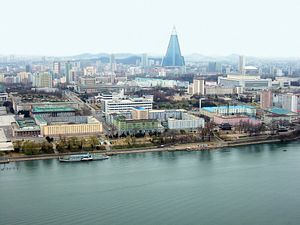The role of the market in history is a common topic for debate. How did market forces impact the rise of the anti-slavery movement in the United States and the United Kingdom? What impact did economic conditions have in the French Revolution? These questions are, and should be, asked in the current debate about North Korea’s socioeconomic development as well. But despite the hope of many, the market might not simply be a story of growing individualism and disconnect from the power of the state. While such a trend may well be at work, it may be much more complicated.
This was recently illuminated through an interesting story by Reuters. In a visit to Pyongyang, they took a look at how markets and everyday business transaction function in North Korea at the moment. As they note, it is telling that a reporter from an international news agency can make transactions in the open, with a government minder by his side, at the black market rate. Business that previously had to be done in the shadows now happens in the open:
Shoppers openly slapped down large stacks of U.S. dollars at the cashier’s counter. They received change in dollars, Chinese yuan or North Korean won — at the black market rate. The same was true elsewhere in the capital: taxi drivers offered change for fares at black market rates, as did other shops and street stalls that Reuters visited.
The most obvious conclusion is that the state is adapting itself to the bottom-up development of the market. Indeed, this is the way the story is often told. In this narrative, the government is only reacting to developments and has long lost the economic policy initiative.
But one could also see a government that is confident enough to relax the rules. It just isn’t a certain fact that the state and the market are two opposing entities.
First, connections to the state still seem to be good for those wanting to trade on the market. For example, according to the surveys conducted by Stephan Haggard and Marcus Noland that laid the foundation for Witness to Transformation (2011), party membership is still considered one of the best ways to get ahead in North Korea (or at least it was at the time when the surveys were conducted). A somewhat similar trend can be discerned in survey results presented by Byung-Yeon Kim of Seoul National University at a conference at Johns Hopkins SAIS in late September this year. Kim’s results also indicate that there is a strong positive correlation between party membership and participation in both the formal and informal economy.
Second, the government is making money off of the market. DailyNK recently reported that the fees charged by state authorities for market stalls was raised. They also noted that regulations of the markets seemed to have gotten more detailed over the years. As noted in this report published by the U.S.-Korea Institute at SAIS, the space that the government allocates to markets has consistently increased in the past few years. Not only have official markets grown, many of them have also been renovated and given better building structures.
All in all, this paints a picture of a government that controls markets while allowing them more space to function. It is not clear that formerly black market activity happening in the open means that the market is gaining ground at the expense of the state. They may well be moving together. That is good news for those hoping for stability, but bad news for those banking on a market-induced revolution. Despite the hope of many that the market will cause the demise of the regime, the role of the market force in North Korea’s history is far from clear.
Benjamin Katzeff Silberstein is the co-editor of North Korean Economy Watch. He is a PhD Student in History at the University of Pennsylvania and a non-resident Kelly Fellow at Pacific Forum CSIS.
This post was originally published by North Korean Economy Watch and appears with kind permission

































